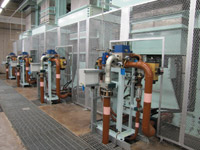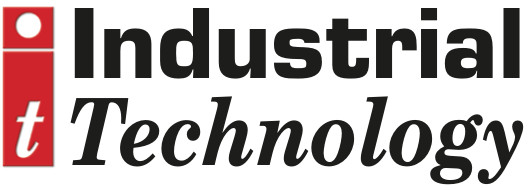
Posted to News on 1st Mar 2012, 00:00
The business benefits of upgrading hydraulic systems
Hydraulic systems of up to 50 years old can still run adequately, but current technology has been immeasurably improved to provide far more efficient and productive solutions. Matthew Livesey discusses the solutions and benefits of replacing ageing hydraulic systems.

>Hydraulic controls traditionally consisted of simple solenoid valves to control large flows producing high shocks in the system. Over time these shocks cause fatigue damage to components and piping, resulting in a hydraulic system that can start to fail and leak. This means additional cost for replacing the oil and cleaning up the mess caused but also production loss if the leakage is severe and if the product is contaminated. Water ingress can also result from poorly maintained systems causing premature failure of rotating equipment like pumps and motors. Additionally, the occurrence of leakages due to fatigue damage can have a detrimental effect on the image of the industry and related hydraulic products.
>The hydraulic systems that are now on the market have been improved and developed over a number of years. Valves now offer proportional control to provide smooth control of cylinder functions eliminating shocks. Companies such as Rexroth back this technology with many years of experience in system design and engineering. Through the combination of new product and industry expertise, end users can now have a hydraulic solution that can take care of pressure control, flow control and decompression of large volumes of fluid under pressure.
>The addition of pumps can also be applied to regulate flow and pressure with power and load control. This not only improves general efficiency but the functionality of the system to match process requirements. These can be provided in customised power units, manifolds and subassemblies designed by trusted and reputable manufacturers.
>Not only have pumps and valves been improved, but pipework systems have also moved forward to form a vital part of an efficient system. For example, GS Hydro a specialist in piping systems were called in by Eastman Chemical Company initially to provide a replacement piping system for the failing old one and subsequently provided the new hydraulic system piping.
>Eastman's chemicals, fibres and plastics are used as key ingredients in products that people use every day. Approximately 10,000 Eastman employees around the world blend technical expertise and innovation to deliver practical solutions. The company is committed to finding sustainable business opportunities within the diverse markets and geographies it serves.
>Eastman has worked to develop a valuable method of performance analysis to determine maintenance issues by listing the failure modes of all items and aspects of the plant. This allowed them to quantify costs to expose the main areas needing reinvestment to eliminate any unnecessary loss. The result was a project looking further at the reliability of the plant balers at the end of the production lines in operation. Hydraulic oil leaks were quickly identified as the highest cause of baler failures.
>Bosch Rexroth began working with Eastman at its US headquarters to address issues with its hydraulic systems, operating baling presses. After the initial success of this project, the Rexroth team turned its attention to the UK plant in Workington. At this location, a filter material used in the cigarette industry is manufactured then compressed by the baling presses to reduce the volume of the final product for economical packaging and transport to overseas customers.
>The first improvement was an expansion of capacity to meet growing market demand with Rexroth overseeing the installation of several new presses. These were installed using a new ring main hydraulic system where one power unit supplies many presses, each with individual control provided by close proximity valve stations. The press boxes are continuously fed with filter material from the production lines, evenly layered automatically and when the box is full of membrane the stripper bin is raised by two hydraulic cylinders before the main press cylinder produces a compact bale, ready for packaging.
>The power unit comprises of a very large cylindrical reservoir and bank of ten motor pump sets which provide low pressure, high pressure and recirculation. Each press is provided with a dedicated valve control module positioned at the press, reducing the distance between the valves and press cylinder. This reduces flow paths to improve performance and keep the required piping to a minimum.
>After a successful period of production with the new ring main system a decision was made to upgrade the remaining baling press systems to eliminate the maintenance problems. Three options were considered; to simply replace the piping, but this would still be subject to the shocks and so likely to fatigue and need high maintenance again. To replace the piping and the main control valves. This would certainly have provided smooth control with low maintenance but the major components the pumps and motors were still very old and inefficient. So option three was adopted to replace the whole system with a new one and gain full advantages for the upgrade.
>To reduce production losses during installation it was decided to replace the systems progressively two presses at a time using a dedicated hydraulic power unit for each pair, including redundancy of motor pump sets. This stage of the project involves many existing baling presses and got underway in November 2011. The upgrades have improved productivity and profitability by reducing maintenance, costly downtime and improving performance and efficiency. Pat Enright, advanced maintenance reliability engineer at Eastman Chemical comments: "Upgrading the press hydraulics is a major reliability initiative at Eastman Workington. Following the successful commissioning of the first new system in November 2011, the benefits of reduced maintenance costs and increased equipment reliability are now evident across the site."
>It is very likely that there are many UK plants that are still using hydraulic systems that were installed many years ago and provide an inferior performance and progressively higher maintenance, health and safety or environmental issues. There are numerous benefits to the installation of a new hydraulic system. Eliminating leaks, water ingress and delays in production by eliminating shock loads. High integrity power packs offer higher efficiency and ultimately a more reliable system with redundancy built in.
>Matthew Livesey is Bosch Rexroth area manager for the North West







